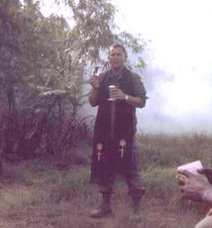
HOW SHALL WE DIE
Teach us to number our days that we may get a heart of wisdom. Psalms
90:12
Three score and ten years--perhaps fourscore--that is our life span, in
round numbers, according to the ancient psalmist. To a youngster in the
prime of life, seventy or eighty or ninety years seems to stretch out
in the an endless succession of days. But in fact, life has its limits;
our days are numbered. A seventy year life span equals exactly 25,567
days counting the extra days in leap years. We have no way of knowing
how many days are allotted to us. But even if we did know, a mere
numerical count of so many days would give us neither wisdom nor
virtue. Surely then, the psalmist meant something more than years when
he prayed, "teach us to number our days." When we make the psalmist's
brief prayer our own, we ask for wisdom rightly to contemplate our
mortality; but also we seek wisdom to live well all the remaining days
of our life.
This is, to me, the lesson of Phil Woodall's life. Phil passed from
this life into the next at a relatively young age: 58 but as we all
know, he lived his life, "large."
For us combat vets, we know Phil mostly as a soldier. He was not only a
good one but the best. As a member of a fire team, he distinguished
himself time and time again. His leadership was evident when he moved
to squad leader, then to the command section as the commander's Radio
Telephone Operator. Highly decorated for his tours of duty, Phil always
remained the poet. Most of us remember how, when the fighting lulled,
he would write his poetry. He would write it on toilet tissue, on c
rations boxes, anything available. In a sense, stretching from Vietnam
to throughout his life, his poetry touched the lives of scores. With
the aftermath of Vietnam, his statement, "they may have died in vain
but they lived in honor" remains the absolute definition of a
generation.
We will miss Phil, the fact that he is not physically any longer in our
world does have an impact. We will miss his presence at our reunions,
the phone calls, the emails, the new poetry scribbled on whatever he
had near. Our lives will not be the same. I think Angelo Patri had it
right: "in one sense, there is no death. The life of a soul on earth
last beyond his or her departure. We will always feel Phil's life
touching ours, that voice speaking to us, that spirit looking out of
other's eyes, talking to us in the familiar things he touched, worked
with, loved as familiar friends. Phil lives on in our lives and in the
lives of all that knew him." The "poetry" of his life lives forever.
Amen.




